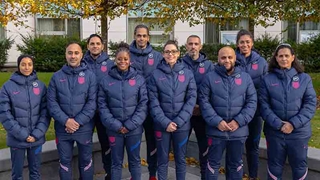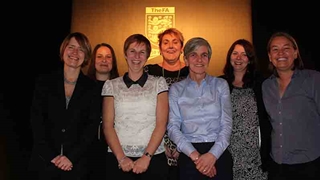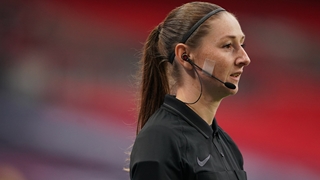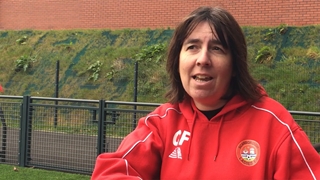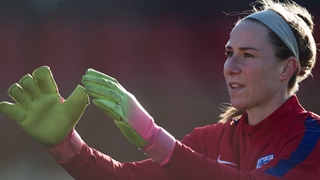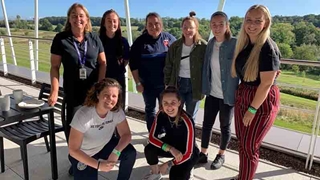
To everybody who loves our game – happy International Women’s Day.
For the FA and myself, it’s a day to reflect and be grateful to all the dedicated, determined pioneers that came before us in the women’s game.
They faced many struggles while laying the foundations for where we are today, never giving up amidst great adversity.
Equally, it’s an opportunity to share excitement as we look to the motivated and talented next generation, who we will support so they can follow in the remarkable footsteps of the trailblazers of our game and continue to break the bias.
We know that there's still much more to do to make women’s football truly for all. As we have recognised previously, the level of engagement with women and girls from historically underrepresented communities is not where it should be.
We want to change this, with equal access for girls to play in schools and clubs; opportunities for the missed generation of women to play and volunteer; and identifying and developing new leaders, coaches and officials that have lived experiences of our many communities in England.
This is our desire, and given the theme of this International Women’s Day, I wanted to share a few examples of how we are working with other organisations and groups to help inspire women and girls to break the bias
We’re very proud of our national partnership with Football Beyond Borders [FBB], which sees teenage girls from historically underrepresented communities – who are aspiring leaders and coaches – trained at an annual Female Leadership Camp.
FBB then continues to support them weekly, and many of these girls have gone on to gain volunteering opportunities or employment within football. Our partnership goes from strength-to-strength and our next camp is in August 2022.
Alongside Amnesty International UK [AIUK], we also run a ground-breaking partnership to support female refugees and asylum seekers to play and volunteer in their communities.
Insight showed that it was more complex to engage females from refugee communities in football and that a strategic partnership with a credible, experienced organisation was needed to address the inequality in provision.
With this in mind, we fund a women’s football officer at AIUK, which has led to the production of a toolkit and providing regular free training sessions to help leaders and coaches grow participation in their communities. The courses are ongoing and can be signed up to here.
We know that women from Asian communities make up the lowest representation numbers in sporting participation in the country and have taken a proactive stance to address this, by assembling a diverse group of Asian women to provide insight and advice on encouraging greater Asian female participation.
This group has become invaluable in helping us to provide more opportunities both on and off the pitch and supporting our Asian Inclusion strategy, Bringing Opportunities to Communities. In recent months, key successes include the distribution of 1200 free Nike Sports Hijabs, aiming to increase participation of Muslim women and girls.
Aside from this, there's so much more work that we are leading on – which I am very proud of – as we look to improve the lives of women and girls through football, including; the work of our FA coach development managers to develop both female coaches and those from historically underrepresented ethnic communities; the exciting Discover My Talent programme; our new FA Mentee Development Programme; and the work underpinning our new FA disability strategy – to name a few.
As everybody looks forward to the UEFA Women’s EUROs this summer, we have employed seven adult women’s recreational football officers, with thanks to funding from Sport England.
These talented young women are developing diversity and inclusion programmes in the tournament’s host cities, including walking football and projects with older women; LGBTQ+ festivals; disability provisions; programmes for women suffering from domestic abuse; Soccercise in places of religious worship; and much more. We want this to be a legacy of England hosting this iconic tournament and serve to inspire others to develop similar programmes.
When the tournament comes to England this summer, it will be 24 years since I received the magical phone call to tell me that I would start my role in developing women’s football for the FA. Who would have thought that all these years later, I would still love my role as much as I did on the first day?
It feels special to still be here so many years on with five of the brilliant women I started that journey with – Kelly Simmons, Donna McIvor, Lucy Wellings, Tessa Baker and Sue Hough – and we must not forget others who also contributed to the journey along the way.
These people have done crucial work, both inside the FA and within the football family, to take the game to the next level. It would've been difficult to believe back then that so many people across the country would earn a living by working to develop the women’s side of our game. We have come a long way indeed!
International Women’s Day is a great opportunity to reflect and recognise the importance of women and girls in all walks of life.
But for our organisation, our work in this area is ongoing all year round. We believe football, both on and off the pitch, is everybody’s game, and we’ll continue to do our utmost and use our influence to ensure this is the case within communities across the country.


